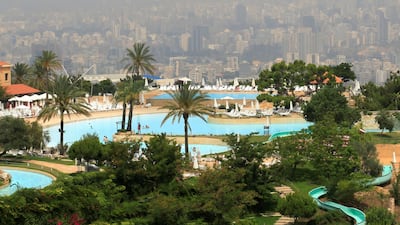The Beirut summer haze is back. The ominous grey-brown cloud that covers Lebanon's capital is a constant reminder of health risks from poor air quality in the capital.
Wednesday's World Environment Day seeks to bring further awareness of the problems associated with poor air quality, with a Greenpeace report suggesting that the Middle East has some of the worst effected cities in the world.
A concentration of harmful particles that are less than 2.5 micrometres in diameter and can penetrate the human body, causing cancer, are three times higher in Beirut than the safe levels recommended by the World Health Organisation.
"Ministries should create a crisis unit ASAP," tweeted Jad Chaaban, an economics professor at the American University of Beirut, alongside a picture of the city's skyline smothered in smog.
Smoking and air pollution are the two main causes of non-communicable diseases in Lebanon, according to a WHO report last year, with children under five years old particularly vulnerable to the effects of smog.
“We have noticed an increase in emergency cases of severe lung infections this year,” said Zeina Aoun, a pulmonologist at Beirut’s Hotel Dieu Hospital.
As is often the case in Lebanon, there are no government statistics to corroborate doctors' observations, but WHO figures suggest that 4 per cent of deaths are caused by chronic respiratory diseases every year and 16 per cent by cancer.
“That’s very high,” said Dr Aoun.
The most common types of cancer in Lebanon are lung and bladder cancer, which can be caused by inhaling toxic fumes that enter the blood and lead to cell mutation.
In October last year, Greenpeace classified Jounieh, a city 20 kilometres north of the capital with fewer than 100,000 inhabitants, as the most polluted city in Lebanon. It sits alongside seven other Arab cities, such as Egypt's Cairo and Iraq's Baghdad, in a list of 50 global hot spots for the level of nitrogen oxides in the air.
Nitrogen oxides are a dangerous pollutant released when fuel is burnt and the city of Jounieh has the fifth-highest levels in the Arab world.
This is in part because the city is host to one of the country’s main power plants, which is poorly maintained and emits thick, black smoke.
The No 1 contributor to air pollution across the country, however, is less visible, yet clearly audible.
With power cuts for at least three hours a day in Beirut, and often much longer outside the capital, most of the population relies on private diesel generators. Their loud humming has become part of the country’s soundscape.
Najat Aoun Saliba, head of the atmospheric and analytical lab at AUB, told The National that, with her colleague Issam Lakkis, she mapped the generators of Beirut and found that there was, on average, one connected to every other building.
The generators release carcinogens that are the equivalent to smoking two cigarettes a day, she said.

As if that wasn't enough to contend with, Lebanese cars are on average 19 years old and emit dangerous fumes. Carcinogen levels measured at traffic hot spots in Beirut are seven times higher than at similar sites in Los Angeles, according to Ms Saliba's research.
Her team is among the very few who are looking into air pollution in Lebanon.
Despite having installed air-monitoring stations all over the country, the Environment Ministry does not release data on the matter.
Preventive measures, such as cutting traffic or closing down schools on peak pollution days, are non-existent.
"When we do air pollution measurement, it's intermittent, not continuous. We definitely need more resources," Ms Saliba said.
She said the first step towards curbing air pollution would be to get rid of the generators, then rejuvenate the traffic fleet and build a public-transport system so there are fewer cars on the road.
"Everybody else has done it," she said. "I don't know why we can't."
Like many Lebanese people, Ms Saliba's not optimistic that the government will carry out anti-pollution measures any time soon.
Although an upgrade to Lebanon's crumbling infrastructure, which would provide round-the-clock electricity by next year, was promised this year, similar moves have been announced before but came to nothing.

